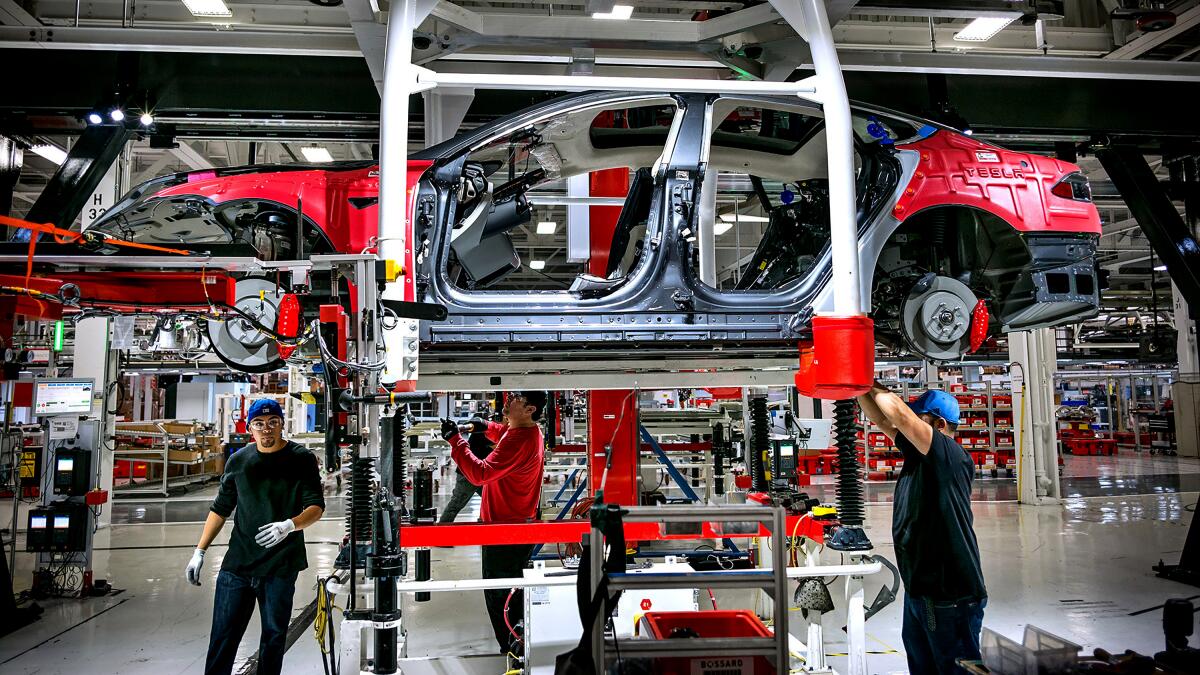Tesla’s 2022 collapse hits 69% after deepest sell-off since April

- Share via
The tailspin in Tesla shares accelerated Tuesday, marking their longest losing streak since 2018, as a report of a plan to temporarily halt production at its China factory rekindled fears about demand risks.
Shares of the Elon Musk-led company closed down 11% at $109.10, for the seventh straight decline and its steepest one-day drop since April. The electric-vehicle maker’s market valuation has shrunk to roughly $345 billion, below that of Walmart, JPMorgan Chase and Nvidia. The latest sell-off will cost Tesla its position among the 10 highest-valued companies in the Standard & Poor’s 500 index, a distinction it has held since joining the benchmark in December 2020.
News of reduced output in Shanghai comes on the heels of last week’s report that Tesla was offering U.S. consumers a $7,500 discount to take delivery of its two highest-volume models before year‘s end, combining to intensify concerns that demand is ebbing. For Tesla, whose valuation is pinned on its future growth prospects, these worries reflect a significant risk.
“Most of the stock’s weakness this year is due to indicators showing flagging demand globally,” said Craig Irwin, an analyst at Roth Capital Partners. Tesla’s estimated revenue growth “is still amazing, but not $385-billion market valuation-type amazing,” he said, referring to the value at the end of last week.
Around the same time that Tesla stopped self-reporting Autopilot safety stats, its crash rates were soaring far higher than those of its competitors.
Analysts on average expect revenue to grow 54% in 2022 and 37% in 2023, data compiled by Bloomberg show.
The hope that Tesla will be the leading EV company in a future dominated by electric cars drove a spectacular eightfold rally in the shares in 2020, earning its place in the S&P 500 and at one point making it the fifth-most valuable stock in the gauge.
But this year the unwinding has come equally fast. It has lost about two-thirds of its value amid Musk’s Twitter takeover and related distractions, investor jitters about growth assets and most recently, worries that high inflation and rising interest rates will dampen consumers’ enthusiasm for EVs.
Wall Street analysts started flagging warnings about EV demand earlier this month, with the average 12-month price target for Tesla falling 10% since the end of November. Meanwhile, the average adjusted earnings estimate for 2022 has declined more than 4% from just three months ago.
Still, analysts’ overall stance on Tesla remains bullish, with the highest share of buy or equivalent ratings since early 2015.
“Despite the stock’s performance, Tesla’s innovation curve appears to be accelerating, a stark contrast to other large tech companies whose incremental product updates appear stagnant at best,” Canaccord Genuity analyst George Gianarikas wrote in a note last week. He added that “green shoots” of recovery may appear in 2023.







